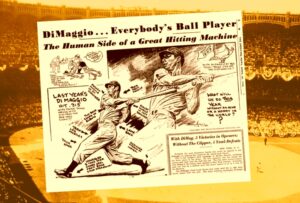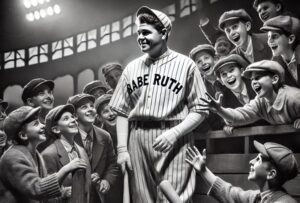Betting on Major League Baseball (MLB) has come a long way from its humble beginnings. The landscape has transformed dramatically over the decades, evolving from physical betting shops to sophisticated online platforms. This shift has significantly changed how fans engage with the sport, offering more convenience, variety, and accessibility. In this article, we’ll explore the fascinating journey of MLB betting, highlighting the key milestones and innovations that have shaped the industry.
Early Days: The Rise of Brick-and-Mortar Betting Shops
In the early 20th century, baseball betting was a popular pastime, with fans placing wagers through informal means, often relying on local bookmakers. These bookies operated out of bars, clubs, and other social venues, where enthusiasts would gather to discuss odds and place their bets. This period was marked by a sense of camaraderie and excitement, as fans engaged in friendly competition and shared their love for the game.
As the popularity of baseball betting grew, more formal establishments began to emerge. Brick-and-mortar betting shops became a common sight, providing a dedicated space for fans to place their wagers. These shops offered a range of betting options, from simple moneyline bets to more complex parlays and prop bets. The physical presence of these shops allowed for a tangible, social experience, where bettors could interact with each other and discuss their strategies.
The Advent of Televised Games
The introduction of televised baseball games in the 1950s and 1960s marked a significant turning point in the evolution of MLB betting. Television brought the excitement of the game into living rooms across the country, expanding baseball’s reach and its betting culture. Fans could now follow their favorite teams and players more closely, making informed betting decisions based on live broadcasts.
This period also saw the rise of sports analysts and commentators, who provided expert insights and predictions, further enhancing the betting experience. Televised games allowed for real-time betting, with fans placing wagers based on in-game developments. This added a new layer of excitement and engagement, as bettors could react to the unfolding action and adjust their bets accordingly.
The Digital Revolution: Online Betting Platforms
The advent of the internet in the 1990s and early 2000s revolutionized the sports betting industry, including MLB betting. Online betting platforms emerged, offering fans unprecedented convenience and access. No longer constrained by the need to visit a physical shop, bettors could place wagers from the comfort of their homes or on the go using their computers and mobile devices.
Online platforms introduced a wide array of betting options, from traditional moneyline and point-spread bets to innovative live betting and futures markets. These platforms also offered detailed statistics, real-time updates, and expert analysis, enabling bettors to make more informed decisions on baseball odds. The ease of use and accessibility of online betting platforms attracted a new generation of fans, who embraced the digital revolution and its many advantages.
The Rise of Mobile Betting Apps
The proliferation of smartphones and mobile technology further transformed MLB betting. Mobile betting apps allow fans to place bets anytime, anywhere, offering even greater flexibility and convenience. These apps provided a seamless and user-friendly experience, with intuitive interfaces and advanced features such as push notifications and live streaming.
Mobile betting apps also introduced new forms of gambling, such as in-play betting, where fans could place wagers on specific events or outcomes during a game. This real-time engagement added a dynamic and interactive element to the betting experience, making it more exciting and immersive. The integration of social features, such as chat rooms and leaderboards, fostered a sense of community among bettors, similar to the camaraderie of the early brick-and-mortar days.
Legalization and Regulation
In recent years, the legal landscape of sports betting in the United States has undergone significant changes. The 2018 Supreme Court ruling that struck down the Professional and Amateur Sports Protection Act (PASPA) paved the way for states to legalize and regulate sports betting. This landmark decision has profoundly impacted MLB betting, as more states have embraced the potential economic benefits and consumer protections of a regulated market.
Legalization has led to the proliferation of licensed online betting platforms, ensuring a safer and more transparent betting environment for fans. Regulatory frameworks have been established to oversee the industry, promoting responsible gambling practices and protecting consumers from fraudulent activities. The shift towards legalization has also opened up new revenue streams for MLB and its teams, through partnerships with betting operators and sponsorship deals.
The Future of MLB Betting
As technology continues to advance, the future of MLB betting looks promising. Emerging technologies such as Artificial Intelligence and Blockchain have the potential to further enhance the experience, offering personalized insights, secure transactions, and innovative betting options. Virtual and augmented reality could create immersive betting environments, allowing fans to experience the game in new and exciting ways.
Additionally, the continued expansion of legalized sports betting across the United States is likely to drive further growth and innovation in the industry. As more states adopt regulatory frameworks, the market will become increasingly competitive, leading to the development of new features and offerings that cater to the evolving preferences of bettors.






